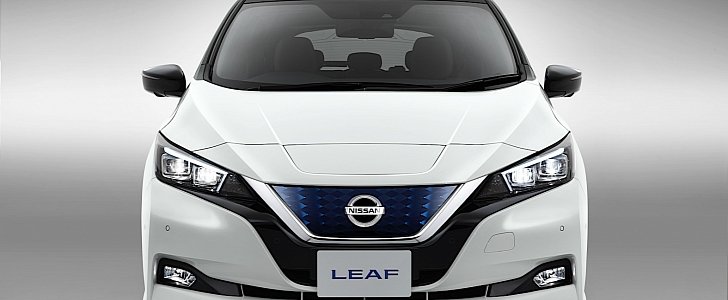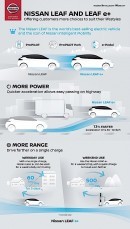For Nissan, the Leaf electric vehicle has proved in the past decade to be a great investment. Curiously enough, despite being one of the best selling electric cars on the planet, the Japanese have done little to follow up on it with other nameplates in this segment.
What they’ve done is continue to improve upon the original Leaf, adding now and then new batteries, new motors or new features.
Staying true to this approach, the Leaf will be offered in a new variant as of 2019. Called e+, this version will come with a higher energy density battery pack, more power and faster recharge times.
According to Nissan, the new battery in the e+ will offer an increase in range of about 40 percent, a figure that in today’s world represents a major improvement. Whereas the regular current generation Leaf can keep running for about 322 km (200 miles) on a single charge, the e+ will be good for 458 km (284 miles). Estimates are made according to the WLTC Japan cycle.
For this new battery, Nissan will be offering a new Quick Charging system capable of operating at 70 kW (100 kW peak). That translates into about the same charging times as the current Leaf hooked to a 100 kW system, but keep in mind that this is for a battery that is 55 larger in storage capacity than before.
The electric motor in the Leaf has been improved as well, now delivering 218 hp and 340 Nm of torque. That’s an increase of about 10 percent compared to the regular version.
Visually, the Nissan Leaf e+ sets itself apart from the existing variant through only minor changes, such as the revised front fascia with blue highlights and an “e+” logo plate on the underside of the charge port lid.
The e+ will at first be available only in Japan, where it will be priced at 4,162,320 yen ($38,200). Pricing for other markets will be announced at a later date.
Staying true to this approach, the Leaf will be offered in a new variant as of 2019. Called e+, this version will come with a higher energy density battery pack, more power and faster recharge times.
According to Nissan, the new battery in the e+ will offer an increase in range of about 40 percent, a figure that in today’s world represents a major improvement. Whereas the regular current generation Leaf can keep running for about 322 km (200 miles) on a single charge, the e+ will be good for 458 km (284 miles). Estimates are made according to the WLTC Japan cycle.
For this new battery, Nissan will be offering a new Quick Charging system capable of operating at 70 kW (100 kW peak). That translates into about the same charging times as the current Leaf hooked to a 100 kW system, but keep in mind that this is for a battery that is 55 larger in storage capacity than before.
The electric motor in the Leaf has been improved as well, now delivering 218 hp and 340 Nm of torque. That’s an increase of about 10 percent compared to the regular version.
Visually, the Nissan Leaf e+ sets itself apart from the existing variant through only minor changes, such as the revised front fascia with blue highlights and an “e+” logo plate on the underside of the charge port lid.
The e+ will at first be available only in Japan, where it will be priced at 4,162,320 yen ($38,200). Pricing for other markets will be announced at a later date.






















